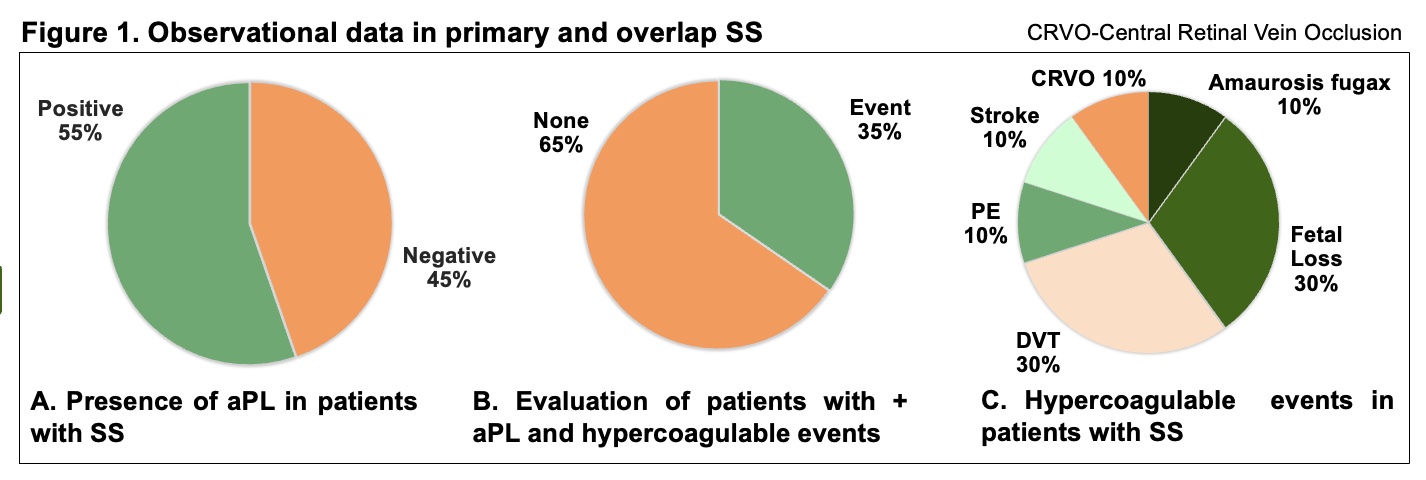Session Information
Session Type: Poster Session B
Session Time: 10:30AM-12:30PM
Background/Purpose: The association between antiphospholipid antibodies (aPL) and autoimmune processes, such as systemic lupus erythematosus (SLE) is well documented, however, there are limited data on the prevalence of aPL in Sjogren’s syndrome (SS). 1 Some literature supports the incidence of aPL in patients with SS ranges from 14% to 38%, and fewer studies have evaluated whether aPL are associated with thrombotic events.1,2 This study aims to investigate the relationship between the presence of aPL in SS and evaluate the utility of routine aPL testing in assessing the risk of hypercoagulable events in patients with SS.
Methods: We conducted a retrospective study utilizing electronic medical records of patients with SS who were evaluated at an academic institution from January 2017 to January 2022. A total of 228 patient records were evaluated with 47 patients meeting inclusion criteria. These patients had a diagnosis of SS by 2016 ACR-EULAR classification criteria and underwent testing for aPL. Positive aPL were those identified on standardized commercial laboratory tests.
Results: Of the 47 patients meeting inclusion criteria, 55% tested positive for aPL. Thirty-five percent of those patients with positive aPL had hypercoagulable events, of which deep vein thrombosis and fetal loss were the most common. Additional factors including tobacco and estrogen use were not observed as increasing the risk for these hypercoagulable events. A subgroup analysis of primary SS patients, excluding all overlap syndromes, was consistent with a ratio of 1 in 3 patients with positive aPL and a diagnosis of a hypercoagulable event. Interestingly, 4 out of the 13 hypercoagulable events were found in patients with negative aPL. These patients had a speckled ANA, the majority with hypergammaglobulinemia, and severe SS symptoms per the EULAR SS disease activity index.
Conclusion: This study demonstrates that half of the patients with SS tested positive for aPL and that one out of three SS patients with positive aPL had a hypercoagulable event. These findings persist when excluding patients with overlap syndromes, suggesting a potential increased risk for hypercoagulable events in this population. Prospective research following a larger population of SS patients would be of clinical value to further evaluate this potential association. APL are ordered regularly in some rheumatic diseases and with our current findings, we propose consideration for routine evaluation as part of the workup in SS.
1. Fauchais AL, Lambert M, Launay D, et al. Antiphospholipid antibodies in primary Sjögren’s syndrome: prevalence and clinical significance in a series of 74 patients. Lupus. 2004;13(4):245-248.
2. Cervera R, García-Carrasco M, Font J, et al. Antiphospholipid antibodies in primary Sjögren’s syndrome: prevalence and clinical significance in a series of 80 patients. Clin Exp Rheumatol. 1997;15(4):361-365.
To cite this abstract in AMA style:
Kaufman K, Culpepper Pace S. Antiphospholipid Antibodies and Hypercoagulable Events in Patients with Sjogren’s Syndrome [abstract]. Arthritis Rheumatol. 2024; 76 (suppl 9). https://acrabstracts.org/abstract/antiphospholipid-antibodies-and-hypercoagulable-events-in-patients-with-sjogrens-syndrome/. Accessed .« Back to ACR Convergence 2024
ACR Meeting Abstracts - https://acrabstracts.org/abstract/antiphospholipid-antibodies-and-hypercoagulable-events-in-patients-with-sjogrens-syndrome/

